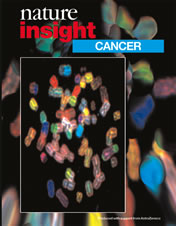Cancer
Vol.
411, No. 6835 (17 May 2001).
|![]() PDF
PDF![]() (91
(91![]() K)
K)![]() |
|
 |
| Cover
illustration |
Cancer is an umbrella term covering a plethora of conditions characterized by unscheduled and uncontrolled cellular proliferation. As the average age in many countries steadily rises, so do cancer-related deaths, so that cancer will be one of the most common causes of death in the 21st century. Almost any mammalian organ and cell type can succumb to oncogenic transformation, giving rise to a bewildering array of clinical outcomes.
The causes of cancer are many and varied, and include genetic predisposition, environmental influences, infectious agents and ageing. These transform normal cells into cancerous ones by derailing a wide spectrum of regulatory and downstream effector pathways. It is just this complexity that has hampered the development of effective and specific cancer therapies.
Any attempt to provide a comprehensive overview of cancer-related knowledge would be futile — there are around 1.3 million cancer-related Medline entries. We have therefore focused on topics undergoing particularly rapid progress, and aimed to provide a balanced picture of the diverse disciplines associated with cancer research. The articles represent particular highlights selected by the editors and authors. Exclusion of important science does not constitute a value judgement.
A further port of call for those interested in cancer-related research is Nature Reviews Cancer.
We hope that you will share our excitement on reading these articles, which epitomize how diverse and dynamic cancer research is at the start of the 21st century.
Bernd Pulverer Senior Editor
All of the articles in this Insight
are free to registered users of Nature's web site. Registration is a simple
process which should take only a few minutes to complete. You can sign up here.
| Cancer
genetics BRUCE A. J. PONDER
| 336 | ||
| Proliferation,
cell cycle and apoptosis in cancer GERARD I. EVAN AND KAREN H. VOUSDEN
| 342 | ||
| The
Hedgehog and Wnt signalling pathways in cancer JUSSI TAIPALE AND PHILIP A. BEACHY
| 349 | ||
| Oncogenic
kinase signalling PETER BLUME-JENSEN AND TONY HUNTER
| 355 | ||
| Genome
maintenance mechanisms for preventing cancer JAN H. J. HOEIJMAKERS
| 366 | ||
| The
microenvironment of the tumour–host interface LANCE A. LIOTTA AND ELISE C. KOHN
| 375 | ||
| Progress
in human tumour immunology and immunotherapy STEVEN A. ROSENBERG
| 380 | ||
| Haematopoietic
cell transplantation as immunotherapy FREDERICK R. APPELBAUM
| 385 | ||
| Cancer
epidemiology in the last century and the next decade JULIAN PETO
| 390 | ||
AstraZeneca
and Cancer discovery from a global perspective
| 396 | ||
